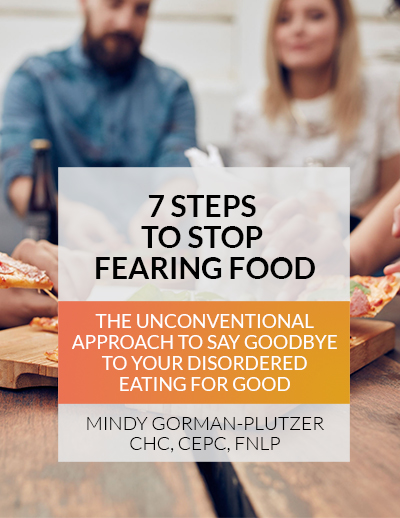The multi-billion dollar weight loss industry wants you to believe that all calories are the same. The food industry, and government agencies love this myth because it keeps you buying more products, which they suggest you eat in moderation. How is that working for you?
While you know I don’t like categorizing food as “good” or “bad”, the truth is that there are better choices for our bodies, which are more complex than a simple math problem like thinking weight management is all about calories in/calories out. Food is more than just calories and flavors. It’s information that signals our cells what to do. Every bite you eat affects your hormones, brain chemistry and metabolism. Sugar calories cause fat storage and cravings. Calories from protein and healthy fats promote fat burning. What counts is the quality, not quantity of the calories.
In his groundbreaking books, The Calorie Myth and Eat More, Lose More, Jonathan Bailor explains there’s very little science to support the dangerous myth that you must “eat less to lose weight.” Here’s a summary of what he shares today….
A famous study conducted by the National Institutes of Health followed nearly 49,000 women for 8 years. One group of women ate an average of 120 fewer calories every day… That’s 350,400 fewer calories overall.
So after 8 years, they must have been a LOT thinner, right? Wrong.
The lower-calorie women were less than a pound lighter. That is not a typo. Eating 350,400 fewer calories had less than 1 percent of the impact predicted by conventional calorie math.
Oh, and by the way, since when is STARVING yourself a good idea for your health?
Conventional diet thinking is based on the assumption that taking in fewer calories forces our bodies to burn fat. Scientists know this is false—so it’s time you knew the truth.
Keep reading and you’ll discover that restricting the number of calories you consume can only lead to one thing…Complete and utter weight-loss failure for at least 19 out of 20 people! (specifically, a 95.4% failure rate)
That’s the documented failure rate of conventional dieting… 95.4%. And it has never been your fault—even though you might think it is.
Here is the scientific fact – when you eat less food, your body does not automatically burn more body fat. It automatically burns fewer calories by slowing your metabolism. That’s why you always feel tired, cold, and crabby when you’re dieting. Your whole body and brain have slowed down.
But wait…it gets worse.
When your body needs calories and it can’t find any, it starts burning muscle–NOT fat.
Studies have shown that up to 70% of the non-water weight lost when eating less is taken directly from your muscles.
Here’s proof…
In a groundbreaking journal article, a physician in the American Medical Association itself wrote that eating less makes us lose weight, NOT “by selective reduction of adipose deposits (body fat), but by wasting of all body tissues…therefore, any success obtained must be maintained by chronic undernourishment.”
So if starving yourself is a bad idea for losing weight… Then eating MORE high quality food must be the answer to losing weight? YES!
And it’s not a theory.
It’s a scientific fact supported by cutting-edge research from the finest medical minds on Earth.
- A study at the University of Connecticut found that people who ate 300 more calories per day burned more body fat
- Researchers at Cornell University split people into groups, each eating 1800 calories a day. The group who’s diet included higher quality calories lost 86.5 percent more body fat than the typical dieters, even though they consumed the same amount of calories.
- In a study conducted at Marshall University, the test subjects were divided into two groups. Group one went on a conventional low-calorie diet. Group two was told they could eat whatever they wanted, just to simply avoid refined sugars and excessive starch. The results? The limited calorie group GAINED 5 pounds, the unlimited, smart calorie group members LOST 11 pounds each.
The highest quality calories come from whole food. These foods are naturally lower in calories as compared with processed foods. Calorie counting isn’t necessary when you eat fresh, whole foods that send the proper signals to your body.
Let’s continue this conversation. Call me today so we can create a food plan for you that allows for more food, better digestion and a more efficient metabolism.






0 Comments